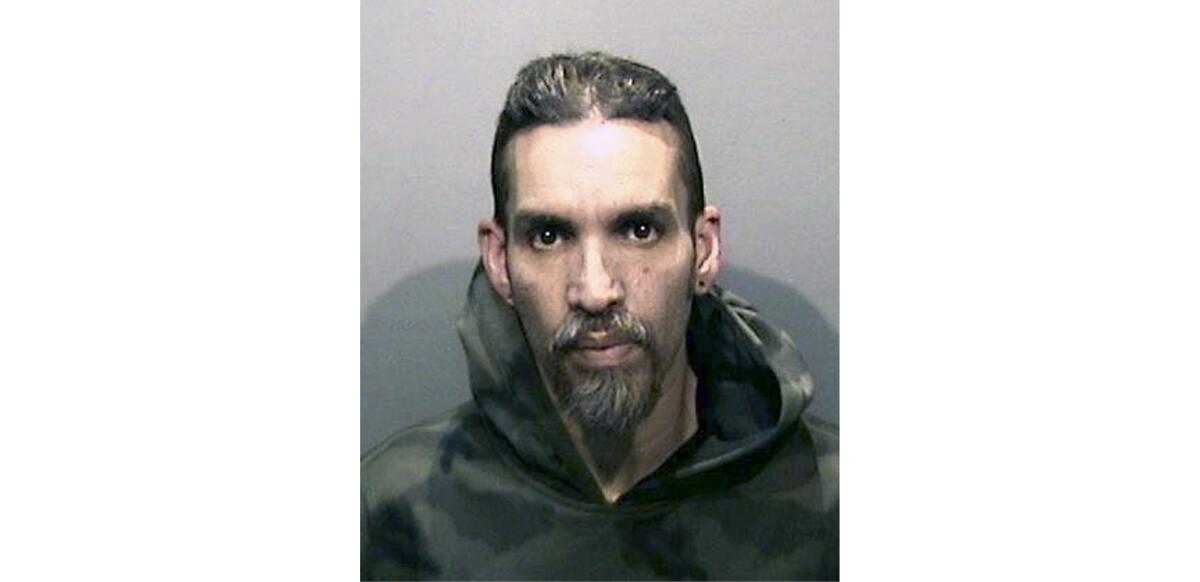Defendant in deadly Ghost Ship warehouse fire in Oakland to serve sentence at home

- Share via
OAKLAND — Derick Almena, the master tenant of a San Francisco Bay Area warehouse that caught fire during a music event, killing 36 people, was sentenced Monday to 12 years in prison, although he is unlikely to spend more time in jail.
Already on house arrest after being released from jail last year because of coronavirus concerns, Almena was ordered to serve the rest of his term under electronic monitoring, followed by three years of probation.
“I know that no family member will find this in any way acceptable, and I accept that responsibility,” Alameda County Superior Court Judge Trina Thompson said at the conclusion of an emotionally charged case that was first derailed by a hung jury, then the pandemic.
Acknowledging their pain, she added: “I wish I could in the stroke of a pen take away your deep loss and your sadness.”
Many of the relatives had urged Thompson to reject a plea deal Almena had struck with prosecutors to avoid a second trial, calling it too lenient.
Almena, 50, pleaded guilty in January to 36 counts of involuntary manslaughter in exchange for a 12-year sentence.
Because he received credit for time already spent behind bars while awaiting trial and for good behavior, he will spend the next one and a half years at home with an ankle monitor.
“This lenient, slap-on-the-wrist sentence is vastly inappropriate for the crimes Derick Almena committed,” the family of fire victim Sarah Hoda said in a statement read to the court via teleconference. “Upholding the DA’s irresponsible plea recommendation would shortchange 36 victims and their families.”
Emilie Grandchamps, the mother of victim Alex Ghassan, said Almena along with the warehouse’s owners and city agencies that are supposed to enforce regulations should be held accountable.
“I often ask, why was my son given a death sentence for being in the wrong place and at the wrong time and those responsible for his and 35 others’ death are given a second chance at life? I want my son’s death not to go in vain,” she said.
Thompson and prosecutors said they took into consideration the challenges of trying the case again, given the challenges of selecting jurors and calling witnesses who could face traveling during a pandemic, and because Almena admitted his guilt.
Almena apologized to the victims and said he was “sick with shame.”
“My shame cannot stand as any defense against what I am responsible for. It is my fault, my terrible accumulation of error, that shaped and built a place so dangerous,” he said in a statement read to the court through his attorney, Tony Serra.
Prosecutors said Almena was criminally negligent when he illegally converted the industrial warehouse in Oakland’s Fruitvale neighborhood into a residence and event space for artists, dubbed the “Ghost Ship,” filling the building with flammable materials and extension cords. It had no smoke detectors or sprinklers.
The Dec. 2, 2016, inferno broke out at the warehouse during an electronic music event, trapping victims on the illegally constructed second floor. Prosecutors said the victims got no warning and had little chance to escape down a narrow, ramshackle staircase.
Family and friends of the victims packed Thompson’s courtroom for months in 2019, becoming familiar faces to the judge, only to see a jury split on whether to convict Almena, who leased the building. At the same trial, the jury also found co-defendant Max Harris, who was the Ghost Ship’s “creative director” and rent collector, not guilty.
Last year, the Oakland City Council agreed to pay just over $33 million to settle civil lawsuits filed on behalf of the victims. The settlement included $23.5 million to families of 32 victims and $9.2 million to a survivor who suffers from “severe, lifelong injuries.”
Almena was also ordered to pay about $181,000 in restitution for funeral expenses and counseling. A restitution hearing will be held April 30.
More to Read
Sign up for Essential California
The most important California stories and recommendations in your inbox every morning.
You may occasionally receive promotional content from the Los Angeles Times.










